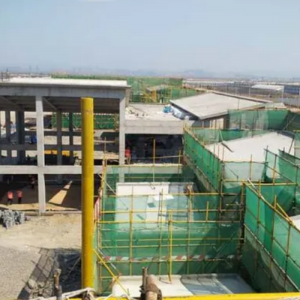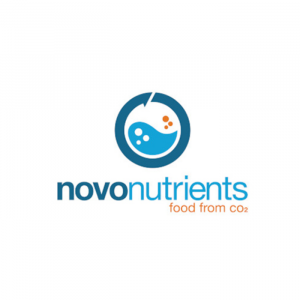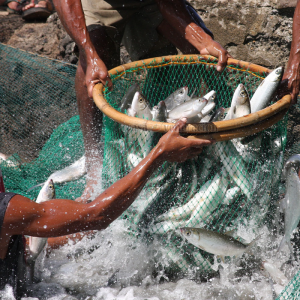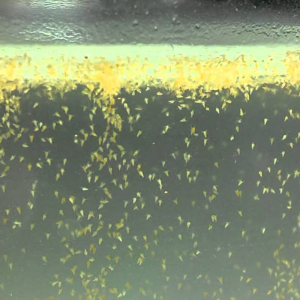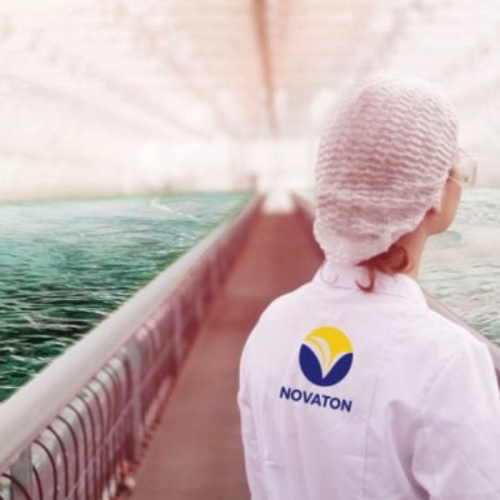
Clean Energy in Aquaculture: Using Technology to Grow Healthy Fish
| Mon, 02 Sep 2019 - 10:46
Novaton, a Swiss multi-innovation company, combines clean technologies with clean energy in aquaculture to build and operate smart cleantech aquaculture farms. Chairwoman and co-founder of Novaton Christine Ledergerber says: “The result is 100% natural, healthy, chemical-free seafood.” Using Novaton’s processes, natural healthy seafood can all be cultivated and produced at large industrial scale and sold at affordable economic prices.
With so much information available on the internet, consumers are becoming increasingly aware of – and angry with – the vast amounts of unhealthy food available on global markets. Experts agree that the bulk of meat, fish, vegetables and other food products sold to consumers are too often weak in nutritional values, polluted with chemicals and riddled with unhealthy saturated fats and hidden sugars. The global population is growing and so is the demand for healthy chemical-free seafood and vegetables; while the old fashioned frequent consumption of red meat and saturated fat is steadily decreasing.
In this day and age, one could think there is no hiding from technology for any industry. Well, almost. Old-established players in aquaculture remain conservative and a majority still operate century-old methods which have long proven disastrous to consumers’ health and the environment. For example, cultivating shrimp in vast open earth ponds, exposed to unstable water quality and crop disease still represent more than 80% of the world’s shrimp aquaculture: this is where Novaton is positioning its offer of clean energy in aquaculture and the technological knowhow for modern, healthy fish farming. Novaton calls this concept ‘positive aquaculture’.
In addition to offering clean solutions to replace the unsustainable methods practiced in the aquaculture industry, Novaton’s business model of building and operating cleantech farms is “designed to attract newcomers and investors looking for fully packaged solutions to leap right into a rare triple mega-trend business opportunity: [to] invest in clean aquaculture, clean energy and hardcore business sustainability,” says Issam Kabbani, CEO and co-founder of Novaton.
Reports abound of marine fisheries reaching saturation. The seas are being depleted of fish faster than they can reproduce. Oceans are contaminated with heavy metals and plastics. The majority of marine farms cultivating salmon, seabass and other in-demand fish breeds operate diesel engines, which pump feed and chemicals into fish-filled cages anchored close to shores. These farms have for decades neglected to treat the accumulating waste from fish, from diesel and from rotting unconsumed fish feed in the sea, creating ideal environments for festering sea lice and pathogens which attack the fish; forcing the farms to increase their use of medicine and chemicals or face massive losses. How can this remain a source of commercial seafood much longer?
Together with Norwegian partners Salmo Solar, Novaton has developed a cleantech marine fish cage operating on solar energy which can function remotely in exposed seas. This autonomous industrial fish cage can be customised for growing salmon, seabass, seabream and other marine species without diesel.
Novaton is currently in the process of developing smart industrial aquaculture platforms able to produce perfectly healthy natural fish inside polluted seas and lakes. This solution is called the ‘Novaton Chessboard’ and will operate on hybrid solar-wind energy systems. These platforms will deploy clean energy in aquaculture to cultivate organic fish in recirculated clean water basins, suspended and isolated inside the polluted waters of seas and lakes. Kabbani says: “Imagine a floating chessboard where the white cases are basins filled with clean unpolluted water, treated to grow organic fish and the dark cases are solar panels, all operated with smart automated management systems.”
The case of the Jangari lake
Dedi Yaya is one of thousands of low income fishermen cultivating tilapia and carp in West Java’s Jangari lake-reservoir in Indonesia. Tens of thousands of simple, 5 m by 6 m metallic fish cages called ‘KJAs’ are kept afloat in small clusters, side by side, using empty rusting barrels as ballasts, framed with bamboo sticks and plastic panels used as narrow walkways between the submerged cages containing the cultivated fish. Thousands of KJAs are scattered on the surface of the lake in allocated plots and form the root of the lake’s rural economy. Some of the larger KJA clusters on the lake belong to commercial fish farms and even to multinational fisheries operating in the Jangari lake.
Over the last few years, Dedi Yaya and thousands of other fish farmers occasionally lose crops worth billions of rupees to mass deaths of fish. This increasingly recurrent economic and social disaster is caused by dramatic decreases in the lake’s oxygen levels and increases in pollution.
According to expert Mr M Agustian in his report to the Indonesian Ministry of Maritime Affairs and Fisheries in West Bandung, dated December 2017, the number of KJAs exceeds 77,000 plots: the Indonesian government’s specified limit is set at a maximum of 12,000 plots. Nitrates and ammonium in the water, emitted by fish waste and unconsumed fish feed, have accumulated over the years, destroying the ecosystem at the bottom of the lake.
Dr Gede Suantika of Bandung Teknologi Institut, a member of Novaton’s Scientific Board, says: “4-5ppm of oxygen [is] required to grow tilapia, but today the levels of oxygen below 2m from the surface barely reach 2.3ppm.” At a depth of 5m, Novaton has measured a level of 1.5ppm.
According to Mr Agustian, the level of pollution has reached such a degree that not only causes mass death of fish, but that releases acids which dramatically corrode the equipment of the power plant and the cement of the Cirata Dam on the Jangari lake.
In co-operation with the Bandung Teknologi Institut, Novaton is now proposing its Chessboard platform to the authorities, to be specifically adapted to resolve the domino effect problems in the Jangari lake and turn the disaster around.
Dedi Yaya and fellow fishermen will be able to resume fish cultivation on exactly the same current spots on the lake they currently occupy, but this time in clean water basins. There will be no need for them to relocate to cities and adjust to new jobs. Fishermen will move from currently cultivating unsustainable low quality fish in acidic water, to growing the highest quality of natural organic fish, rich in healthy nutritional values – fish oils, omegas, proteins – suitable for export to global markets at premium prices. It will now be possible to accommodate an even larger number of the existing cultivation plots and create new rural jobs.
Furthermore, the Chessboard will produce low cost solar energy to operate the water treatment and waste management of the clean aquaculture systems. As proposed, the Chessboard will double up as a floating solar plant able to produce clean low cost energy up to 100MW or more, which can be fed into the national grid; supporting the hydroelectric power plant of the Circa dam and reduce reliance on coal-operated electric plants.
“The situation has become untenable. We need to implement the first Chessboard pilot as soon as possible,” says Dean Dr Nyoman at Bandung Teknologi Institut, which is partnering with Novaton to resolve this socioeconomic disaster. Novaton is currently conducting discussions with stakeholders in West Java to reach preliminary agreements to build a commercial pilot.
Once the Jangari lake pilot is operating successfully, Novaton will have established the viability of the positive domino effects of the Chessboard platform. When this stage is reached, the company intends to build a permanent consortium of strategic partners to offer and operate such solutions on a global scale. Around the world other ‘Jangari lakes’ are threatening the livelihood of hundreds of thousands of low income people and their environment. The Novaton Chessboard platform should be able to turn disastrous socioeconomic situations around to optimal solutions.
The importance of clean energy in aquaculture
To this day, fish farmers remain exposed to critical factors dramatically affecting their harvest: unstable water quality, crop disease, high crop mortality and unpredictable behaviour from surrounding natural elements.
For years low labour costs and outdated cultivation methods substituted for water pumps, filters, aerators and skimmers but created other serious problems and increased the pollution in open ponds: untreated organic waste, high crop mortality rates and the increased use of chemicals and antibiotics to combat pathogens attacking fish and shrimp were all cultivated in increasingly polluted environments.
Not all farmers can afford modern equipment; and energy costs remain an underlying issue. Usability of equipment is dependent on the availability of electricity. Unfortunately, energy supply remains scarce and expensive in most developing countries. In Indonesia and Thailand, electricity costs between between $0.12/kWh and $0.15/kWh (€0.11/kWh-€0.14/kWh) and is often supplied by coal operated electricity plants. Sometimes it is totally unavailable in rural areas. Vietnam subsidises some of the electricity costs incurred by farmers, but for how long is this sustainable?
Clean energy in aquaculture is one of Novaton’s core proficiencies and strategies: by introducing low cost solar energy whenever possible, smart water management systems can play their essential role at affordable costs.
Clean energy combined with clean technology
Achieving performance in land-based aquaculture requires the combination and management of several essential parameters. Novaton has taken the growing ‘Recirculated Aquaculture Systems’ (RAS) aquaculture technique several steps further by including proprietary cleantech solutions, organic biology and smart water management systems operating Artificial Intelligence (AI). This includes the treatment of waste to avoid dumping any waste pollution back into nature and operate a medicine-free and chemical-free aquaculture, with adequate biology, inside recirculated clean water basins. The end result is a combination of win-win factors all the way to happy consumers eating natural and healthy fish.
This is why Novaton calls this chain reaction ‘positive Aquaculture’. The three key success factors for high performing clean aquaculture – clean energy, smart water systems and no chemicals or antibiotics used – are now assembled under one integrated operating system. Crops are 100% natural, free of chemicals and contain highly improved nutritional values. “We test our crops at Osaka University and the results are recurrently confirmed: higher proteins, higher Omegas, higher PUFAs, lower uric acids, all extremely beneficial to overall health,” says Dr Suantika.
Quality shrimp and other fish farming is now possible anywhere there is sufficient sun, limited amounts of saline water and a small piece of land, operating smart tech natural aquaculture on low cost solar power.
Novaton has signed contracts to build and operate cleantech farms in several countries on three continents. Global distributors are in talks with the company to secure supply to retailers and directly to consumers worldwide. The food distribution business is also fast changing: Uber Eats, Amazon and Alibaba are introducing new business models to deliver processed and cooked food directly to consumers.
The Hinderling islands
Professor Thomas Hinderling was a Swiss nuclear scientist. “His dream was to build giant solar islands producing clean energy anywhere on the seas, available for all, replacing nuclear energy plants and fossil fuel,” says his widow Christine Ledergerber Hinderling.
For this purpose, Novaton was created by the couple in 2010. A proof of concept was built in the UAE in the first decade of this century, but the economic crisis and the sad passing away of Professor Hinderling put a stop to the project.
His wife kept the company afloat for years, preserving the patents and tirelessly looking for the right partner and opportunity to achieve her late husband’s dream. This opportunity arrived in 2016 when she met Issam Kabbani, a successful entrepreneur from mixed Swiss-Saudi origins. The two decided to partner in the reviving of Novaton and focus the ‘solar islands’ technology to serve aquaculture’s dramatic energy problems. “We soon discovered that offering clean energy alone was not sufficient. Modern aquaculture needs complete cleantech solutions operating on clean energy,” Kabbani says. Novaton assembled a scientific board composed of eminent world class scientists and became what it is today; a provider and operator of cutting edge cleantech aquaculture farms, producing 100% natural seafood.
Novaton intends to achieve Professor Hinderling’s vision within seven years. However, the Hinderling solar islands will not only produce clean energy at sea, they will also contain and operate smart aquaculture farms underneath, producing premium quality seafood at industrial scale.
Recently Professor Bruce Patterson and Dr Andreas Borgshulte, both of EMPA Switzerland and members of Novaton’s scientific board, have co-published a scientific study (PNAS) whereby a Hinderling island could be adapted to extract excess CO2 and hydrogen from ocean waters and produce methanol, a liquid fuel suitable for transportation. Removing excess carbon dioxide from the environment, producing clean energy in aquaculture and producing clean seafood at the same time may be possible sooner rather than later.
Healthy, edible 24 carat gold
“Novaton produces 24 carat gold,” says one industry expert and regulator who requested anonymity.
To execute on signed long term multinational contracts to build cleantech farms in various countries, Novaton is now opening its capital to attract investors with similar values and vision. It recently expanded its supervisory board to include world reputed strategists and financial experts; and is looking to expand its operational team.
“Our challenge is not in finding clients or developing our technologies, it is and will always be to find the best and most qualified persons to join our operational team,” says A Mohanna, Novaton’s MENA director and senior member of the management team. For this reason, Novaton keeps close ties with leading scientific institutions such as TUM, Germany, EPFL/CSEM Switzerland and ITB in Indonesia. The company is planning to build training centres in each country where it is operating in co-operation with local scientific universities, to train cleantech aquaculture operators for its farms.
The domino effect does not stop here. Christine Ledergerber says: “To achieve a completely natural value chain, we are looking at partnering with natural fish feed producers and use microalgae and shrimp shell to create the most suitable organic feed for our crops.”
Source : Goverment Europe













